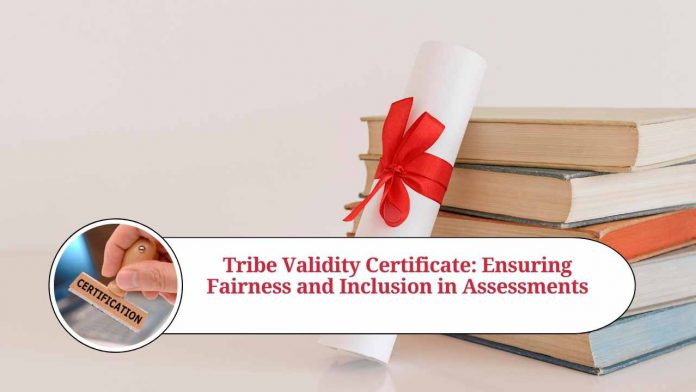Tribe Validity Certificate: What it is and Why it Matters
In today’s world, where diversity and inclusivity are increasingly important, understanding the concept of tribe validity and having a tribe validity certificate is becoming more and more crucial. This blog post will cover everything you need to know about tribe validity, including what it is, why it matters, and how to obtain a tribe validity certificate.
What is Tribe Validity?
Tribe validity is a measure of how well a test or assessment accurately measures the abilities or characteristics of a particular group or “tribe” of people. In other words, it’s a way of determining whether a test is fair and unbiased towards a particular group.
For example, let’s say a company is using a cognitive assessment to screen job candidates. If the assessment is only validated for people from a certain cultural background, it may not accurately measure the abilities of people from other cultural backgrounds. This means that the assessment would have low tribe validity for those groups, which could lead to unfair hiring practices.
Why does Tribe Validity Matter?
Having a test or assessment with high tribe validity is crucial for promoting fairness and inclusivity in various areas, including education, employment, and healthcare. Without it, people from certain groups may be unfairly excluded or disadvantaged.
For instance, if a standardized test used for college admissions has low tribe validity for a particular racial or ethnic group, it may result in fewer students from that group being accepted into college. This could have long-term consequences for the group’s economic and social mobility.
Similarly, in healthcare, tests and assessments that are not validated for certain groups can lead to misdiagnoses or incorrect treatment plans, which can have serious consequences for patients’ health and well-being.
How to Obtain a Tribe Validity Certificate
To obtain a tribe validity certificate, you must first conduct a validity study that demonstrates the test’s accuracy and fairness towards a particular group. This typically involves administering the test to a sample of people from the group in question and comparing their scores to those of a control group.
The results of the study are then analyzed to determine the test’s validity for the particular group. If the test is found to have high tribe validity, a tribe validity certificate can be issued.
It’s important to note that obtaining a tribe validity certificate is not a one-time process. Validity studies should be conducted regularly to ensure that the test remains accurate and fair for all groups over time.
Exploring the Importance of Tribe Validity
Tribe validity goes beyond the concept of individual fairness and dives into the realm of group fairness. It acknowledges that individuals from different backgrounds may have unique experiences, knowledge, and perspectives that can affect their performance on tests and assessments. By considering tribe validity, we can strive for a more comprehensive understanding of an individual’s abilities and potential.
Promoting Diversity and Inclusion
One of the key reasons why tribe validity matters is its direct connection to promoting diversity and inclusion. In a world that celebrates the richness of different cultures, races, genders, and identities, it is crucial to ensure that assessments do not discriminate or disadvantage certain groups.
Tribe validity allows us to identify and rectify biases that may exist within tests and assessments. By acknowledging and addressing these biases, we can create a fairer playing field where everyone has an equal opportunity to showcase their abilities and talents.
Education and Equal Opportunities
Education is a powerful tool that can transform lives and open doors to new opportunities. However, when assessments lack tribe validity, they can inadvertently perpetuate inequality. Students from disadvantaged backgrounds or underrepresented communities may face additional barriers when their abilities are not accurately measured or recognized.
Tribe validity in educational assessments ensures that students from all backgrounds are given a fair chance to showcase their knowledge and skills. It helps identify any biases or cultural limitations present in the assessment process, enabling educators to tailor their teaching strategies and curriculum to meet the diverse needs of their students.
Employment and Fair Hiring Practices
Tribe validity also plays a vital role in the realm of employment. Companies rely on assessments and tests to make informed hiring decisions, seeking the most qualified candidates for the job. However, if these assessments lack tribe validity, they may inadvertently exclude talented individuals from underrepresented communities.
By prioritizing tribe validity in employment assessments, companies can ensure that their hiring processes are fair, unbiased, and inclusive. This allows them to tap into a broader talent pool, fostering a diverse workforce that brings together different perspectives, ideas, and experiences.
Healthcare and Accurate Diagnoses
Tribe validity is equally relevant in the field of healthcare. Diagnostic tests and assessments must accurately identify health conditions and guide treatment plans. However, if these assessments are not validated for specific populations, there is a risk of misdiagnoses and ineffective treatments.
Tribe validity in healthcare assessments ensures that individuals from different cultural backgrounds receive accurate diagnoses and appropriate care. It acknowledges the unique biological, cultural, and environmental factors that can influence health outcomes, leading to more effective and equitable healthcare practices.
Continual Assessment and Improvement
Obtaining a tribe validity certificate is not the end of the journey but the beginning. Validity studies should be conducted regularly to ensure ongoing accuracy and fairness. By monitoring and assessing the validity of tests and assessments, we can identify areas for improvement and work towards creating more inclusive and equitable evaluation processes.
Conclusion
Tribe validity is a fundamental aspect of fairness and inclusivity in various domains of society. By recognizing the importance of tribe validity and obtaining tribe validity certificates, we can foster diversity, equal opportunities, and accurate evaluations in education, employment, healthcare, and beyond. By striving for tribe validity, we take a significant step towards creating a more equitable and inclusive world.
Read more useful content:
Frequently Asked Questions (FAQs)
What is tribe validity?
Tribe validity is a measure of how well a test or assessment accurately measures the abilities or characteristics of a particular group or “tribe” of people.
Why is tribe validity important?
Tribe validity is crucial because it ensures fairness and inclusivity by evaluating whether a test is unbiased and accurately measures the abilities of individuals from diverse backgrounds.
How is tribe validity different from individual validity?
While individual validity focuses on the accuracy of a test for individuals in general, tribe validity specifically examines the accuracy of a test for a particular group or “tribe” of people.
What is a tribe validity certificate?
A tribe validity certificate is a document that indicates that a test or assessment has undergone a validity study and has been found to have high tribe validity for a specific group.
How can I obtain a tribe validity certificate?
To obtain a tribe validity certificate, you need to conduct a validity study that demonstrates the test’s accuracy and fairness towards the particular group. The study involves comparing the scores of the group in question to a control group.
Who issues tribe validity certificates?
Tribe validity certificates are typically issued by organizations or institutions responsible for conducting the validity study, such as educational institutions, research organizations, or assessment agencies.
Are tribe validity certificates permanent?
Tribe validity certificates are not permanent. They are based on the validity study conducted at a specific time and need to be regularly reviewed and updated to ensure ongoing accuracy and fairness.
Can tribe validity certificates be used for multiple purposes?
Yes, tribe validity certificates can be used for multiple purposes as long as the test or assessment is being applied to the same group for which the validity study was conducted.
How does tribe validity impact employment practices?
Tribe validity ensures that employment assessments are fair and unbiased, promoting equal opportunities for individuals from different backgrounds and preventing discrimination in the hiring process.
Is tribe validity only relevant to standardized tests?
No, tribe validity is applicable to a wide range of tests and assessments, including educational exams, employment assessments, healthcare diagnostics, and any evaluation that involves comparing groups of individuals.




















